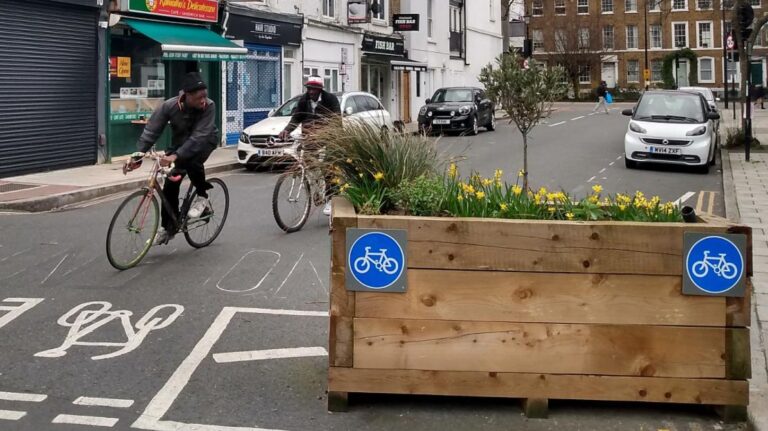After recent pro-motorist comments from prime minister Rishi Sunak amid his launch of a national review into low traffic neighbourhoods (LTNs), cycling advocacy group Cycling UK has urged Sunak to revisit this idea and instead encourage their uptake.
LTNs are designed to deter car use and congestion and promote active travel, such as walking and cycling, by limiting cars’ access to certain roads. They are often implemented to stop drivers using certain roads as through-routes.
The comments were made in a piece published in The Telegraph, wherein the prime minister said “the vast majority of people in the country use their cars to get around and are dependent on their cars.”
Some campaigners have have pointed out that, as the Conservative government reduced funding for cycling and walking by 75% in May 2023, liveable neighbourhoods are a more affordable method of introducing safe infrastructure that enables walking and cycling.
Recent controversy surrounding the ULEZ, which has been compounded by the High Court’s rejection of five Conserative-led councils’ legal challenge to its expansion and a recent unexpected by-election victory for the Conservative party in Uxbridge and South Ruislip, has meant that so-called ‘anti-car schemes’ have become a major feature of the green policy debate.
Sarah Mitchell, chief executive of Cycling UK, said: “Rather than attempting to pit people driving, cycling and walking against one other through divisive rhetoric, and turning liveable neighbourhoods into a political football, the government should be celebrating their popularity and success.
“Evidence shows quieter streets and less traffic are overwhelmingly popular and support for these things only increases once they’ve been implemented and people see the benefits.
“It’s lazy to label measures which reduce car dependency as anti-car, people want to be less car dependent. Liveable neighbourhoods give people the opportunity to drive less and cycle more, consequently enjoying cleaner air, safer streets and less traffic and congestion.
“…That’s why Cycling UK is urging the government to encourage their take-up – for the benefit of everyone in our communities and for the planet.”
Mitchell pointed out that LTNs aren’t a “magic bullet”, but can work successfully with other traffic-calming and sustainability measures when they are “designed in consultation with communities”.
Cycling UK is part of the active travel consortium Walking and Cycling Alliance, along with transport and road safety and environmental groups, which is reportedly now considering how best to respond to recent government policy decisions on transport.





